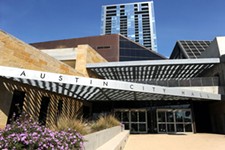Council Recap: Meet the New Chief, Not the Same as the Old Chief
Chacon commits to change as academy moves toward reopening
By Austin Sanders, 1:20PM, Fri. Mar. 26, 2021
With a unanimous vote of the City Council, Assistant Chief Joe Chacon leveled up to become interim Chief of Police, as Brian Manley retires this weekend after 30 years at the Austin Police Department.
Before Council’s vote to confirm Chacon’s appointment (announced earlier this week by City Manager Spencer Cronk), the new chief already made a bit of news. Testifying before the House State Affairs Committee on House Bill 1900 (by Rep. Craig Goldman, R-Benbrook) – designed to punish cities that reduce their police budgets – Chacon sought to correct perceptions that Council’s $21.5 million cut to this year’s APD budget has unleashed havoc on the city.
Most of those dollars would have gone toward cadet classes at the Austin police academy, which Council put on hold following reports of the academy’s extensive problems – a decision Chacon told lawmakers was necessary. He also clarified that most of the additional $150 million GOP lawmakers claimed was “cut” from APD has been spun off into other departments. “Just because money was moved out of our budget does not mean that whatever that money was responsible for is no longer being done,” Chacon told the committee. “It simply resides in another budget now.”
Back at City Hall to face brief questioning from Council, Chacon committed to rejoining the cross-agency Sexual Assault Resource and Response Team (SARRT), which Manley withdrew from in 2018 along with former Travis County D.A. Margaret Moore. In response to questioning from Council Member Greg Casar, Chacon also said he’d try to improve APD’s often-icy working relationship with the Office of Police Oversight and its director Farah Muscadin. When Chacon disagreed with a recommended policy change from OPO, he told Casar, he would provide a response in writing to Muscadin that could then be shared with Cronk, Council, and the public. He was less amenable to committing to include all questions submitted by OPO in Internal Affairs interviews of officers under investigation. “If there is a pertinent question, it will be asked,” Chacon told Casar, “but there are differences of opinion on if a question is pertinent. But I will work with OPO to make sure questions [Muscadin] wants asked are asked.”
Mayor Pro Tem Natasha Harper-Madison asked Chacon for his thoughts on the divide between APD’s executive team and the rank and file. “For some officers, loss of love of the job didn’t come from our constituents,” Harper-Madison said, “it came from within the department, their co-workers, their peers.” She alluded to the findings of the third-party Tatum report of a tolerance of bigotry among ADP’s top brass, with little to no accountability for such behavior. Chacon said that a cultural divide between chiefs and officers was not intentional, “but very much the outcome,” and vowed to do something about it. “I recognize, from criticisms levied at myself and other members of executive staff, our role in creating a divide or allowing it to happen,” Chacon said. “Under my leadership, that will change.”
Although Chacon was confirmed without opposition, Council split on its vote to resume cadet classes at the academy by June 7 if certain requirements are met (and if the budget is amended at a later date to provide funding). The Reimagined Police Academy Blueprint was approved 8-1-2, with Casar opposed and Harper-Madison and CM Vanessa Fuentes abstaining; the latter three cited concerns from community members that the city is moving too fast to reopen the academy and not heeding input from its Reimagining Public Safety Task Force.
“I’m struggling with this item,” Harper-Madison said before the vote. She said that the desire among some to reopen the academy is “deep and very personal,” while acknowledging that the culture problems at APD and the academy run too deep to all be solved in the eight months since the last cadet class graduated in October 2020. But, as Harper-Madison noted, Council’s vote does not mean the next class will begin in June no matter what. The $2.2 million budget amendment to fund the class will not be offered for Council consideration until after April 20, when (at a Council work session) a consultant team from Kroll Associates presents its final report and the task force presents its recommendations for how Austin can continue to divest from police and fund public safety alternatives.
The vast majority of those who spoke on the item opposed taking any action until those reports are delivered. But as Cary Roberts of the Greater Austin Crime Commission, the sole pro-police advocate on the task force, rightfully pointed out, that panel is not focusing on the academy. “The task force is working on a lot of important topics, but not police training,” Roberts told Council. “Austin is ready to restart [cadet classes] … the academy curriculum has been completely overhauled.”
Those curriculum changes have not been finalized, however, and other members of the Reimagining Public Safety Task Force feel differently. In fact, several task force members pointed out that, thus far, a formal vote has only been cast on one recommendation – to not resume cadet classes until changes to training materials and techniques were finalized and implemented. That vote occurred at the task force’s Jan. 20 meeting, and for some members, it feels as if the city is already ignoring their work.
Chris Harris of Texas Appleseed said hastening to resume cadet classes runs counter to the mission of the task force to find ways to reduce the role of police in the lives of Austinites, and instead empower others to handle some problems that now fall into the lap of police officers.
“We're focused on how we can address public safety needs and issues better, with the assumption that to do that, we further reduce police duties and budgets,” Harris told the Chronicle. Funding a new cadet class, and thus accepting the premise that APD is understaffed, makes that task harder. “The question our recommendations will pose is what size force do we need,” Harris continued, “but they've rushed to a predetermined answer of ‘bigger’ despite the fact that Austin still leads all Texas cities in police funding per capita.”
In response, both Cronk’s team and Council have sought to reassure the public that no cadet classes will begin until reforms recommended by Kroll, OPO, and community stakeholders are implemented. The first class after that (the 144th) is being described as a pilot that will be evaluated to see that academy reforms were implemented faithfully and are having the desired effect.
Got something to say on the subject? Send a letter to the editor.
A note to readers: Bold and uncensored, The Austin Chronicle has been Austin’s independent news source for over 40 years, expressing the community’s political and environmental concerns and supporting its active cultural scene. Now more than ever, we need your support to continue supplying Austin with independent, free press. If real news is important to you, please consider making a donation of $5, $10 or whatever you can afford, to help keep our journalism on stands.
Maggie Q. Thompson, June 13, 2022
Austin Sanders, Aug. 13, 2021
May 24, 2024
May 17, 2024
City Council, Austin Police Department, APD, Joe Chacon, Brian Manley, cadet classes, APD Training Academy, Greg Casar, Natasha Harper-Madison, Vanessa Fuentes, Reimagining Public Safety Task Force, reimagining public safety, Sexual Assault Resource and Response Team, SARRT, Office of Police Oversight, Farah Muscadin, Tatum report, Reimagined Police Academy Blueprint, APD Internal Affairs, Chris Harris











